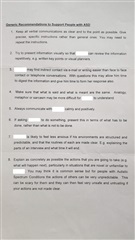I work in a office building. I'm one of three women and a man. My job is to answer the phone and use a computer, my day consists of me typing, speaking on the phone and engaging in conversation (help!) with my work colleagues. My friend April who works next to me is really nice and I think she knows there's something different about me because she seems to give me a sort of comforting smile a lot of the time. Work is hard, every day I spend ages making sure I look right for work and change my clothes and redo my hair about fifty times before I finally leave. When I get to work I spend the day feeling anxious because I know I'll have to engage in workplace communication, either work banter or one of my colleagues will ask me if I have a file or if someone called. This sends me in to a massive brain shutdown moment where I spend the next ten minutes trying to think and communicate at the same time, which results in me not finding the right words and just sort of babbling like a baby.
Working is difficult, mostly because of the amount of things I have to do. Focusing, communicating, being out of my safe zone and *shudders* office meetings where I sometimes have to stand up and talk to my colleagues as well as our boss... Usually after a meeting I end up throwing up in the bathroom and have a mini panic attack.
Does anyone else here work and have similar problems to me?



